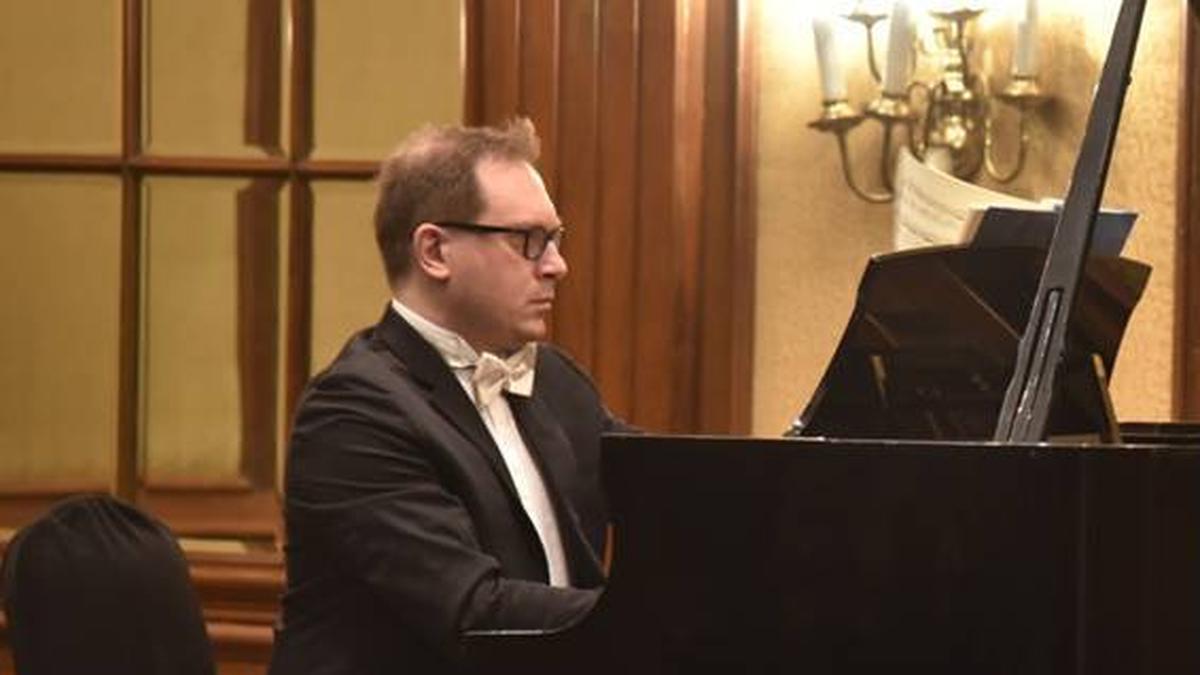
Pianist Daniele Buccio plays all of Beethoven’s 32 Sonatas at his Kolkata concert
The Hindu
Italian pianist Daniele Buccio played the entire 32 Piano Sonatas of Beethoven in Kolkata
With a demeanour befitting a surgeon about to perform an operation, Daniele Buccio sat at the piano, and went about the keys with surgical precision. And, at the end of his marathon-recital, Daniele lifted his impassive visage from his 92-Key Bösendorfer 225 Grand. Well, he did take a few mini-bows, more to give the audience time to express their awe than to gather his energy.
Daniele (44) recently performed all 32 piano sonatas of Beethoven, incidentally composed between 1795 and 1822 — a first in this country, in its designated sequence — spread across four separate recitals, comprising two nearly-equal sessions totalling 140 minutes with only a slim interlude, each day, except for the finale which clocked three hours and fifteen minutes.
Barring the inaugural by-invitation performance at Oberoi Grand (the piano there was an in-house Boston), the other three, non-ticketed concerts took place at the intimate Sandre Hall, eponymously named after Philippe Sandre, the founder of the Calcutta School of Music, the ideator–organiser of the event. This would be Daniele’s sophomore collaboration with CSM, the earlier one being a mid-February 2023 concert, where we were made privy of his finesse and tenacity, when he presented all of Chopin’s 24 Preludes, lasting a tad more than two hours on a stretch and not even a wee on the fritz.
Where even the likes of Rudolf Serkin, 20th Century’s undisputed Beethoven-whisperer would shudder to negotiate all of these 32 sonatas on the trot, Daniele probably took it up because he likes “consistent theme(s)” and has a penchant for the genius-composer. The Verona-born seemed to import an inspired amount of romance and risk in his pianism as would suit an indegene of the Italian city.
Daniele’s structure, lines and purpose were clear, his contours were controlled and the engagement demonstrative yet internal.
One could not only identify the influence of Beethoven’s predecessors — Bach’s rigour, Haydn’s (his most important teacher) wit, Liszt’s virtuosity and, of course, Mozart’s spontaneity and versatility. Elevating it beyond contemporary categorisation, one could also gauge the effect of Brahms, Schubert, and Rachmaninoff. One was especially reminded of Rach 3 during Prestissimo of No. 29 and 30. At some moments, you also got a feel of pop-rock tunes and cinema BGM. The last one brought to mind Moonlight Sonata (No.14). Yes, the audience did relish the familiar including the Pathétique, Waldstein, Appassionata and the pastorals. He came up with the most-unplayable Hammer-klavier, and that too without a page-turner. The way he snapped the pages during the frenzied passageworks and yet returned to sweet spots lent a veritable stunt element to the performances. Another interesting factor was his shunning the piano stool for a chair. He was most often perched at its edge.
The way Daniele approached the sonatas seemed to indicate his dissertation (he did his research in musicology from the University of Bologna) on the history of Gestalt psychology that emphasises that the whole of anything is greater than its parts. Though composed as self-contained pieces, all 32 sonatas do link-up to an elevated scope.











